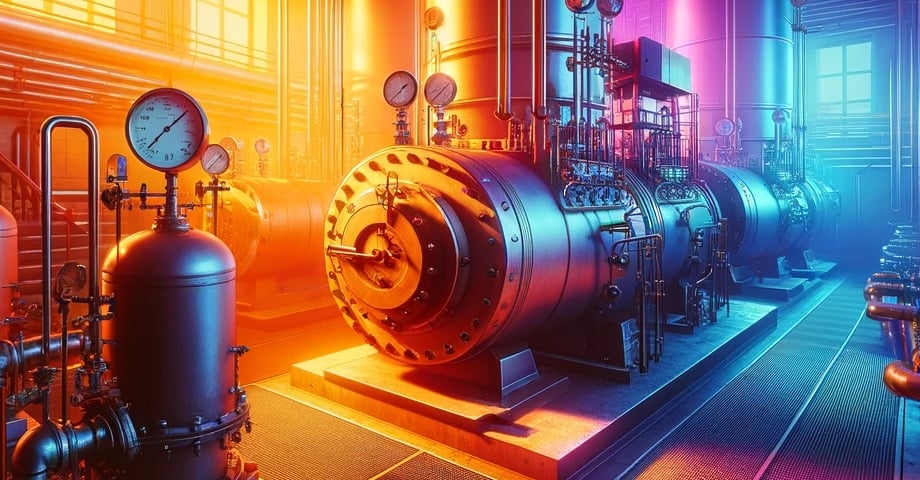Local Law 97 is a significant concern in New York City, especially as we approach the 2030 and 2035...
What is a Boiler Room? And How You Can Make it Work For Your Building

When managing or owning commercial real estate, the boiler room concept frequently surfaces as it’s critical to maintaining the building's comfort, safety, and operational efficiency.
Let’s demystify boiler rooms and their significance in building management, equipping you with actionable strategies to optimize your operation for utility lower utility costs and tenant satisfaction.
Understanding the Boiler Room
A boiler room houses the boilers and associated equipment necessary for generating steam or hot water, essential for heating buildings and supplying hot water throughout the building.
This environment includes a boiler, pumps, valves, feedwater tanks, exhaust stacks, and various controls, all working in concert to ensure efficient and safe heat production. The size and complexity of a boiler room can vary dramatically depending on the building's heating demands, which are influenced by the available space, energy goals, and specific requirements of the facility.
The boiler room's primary role extends beyond merely supplying consistent heating and hot water; it is pivotal to a building's energy consumption and operational costs. An efficiently managed boiler room can substantially reduce energy waste, lowering utility bills and fostering environmental sustainability. Moreover, compliance and safety are critical aspects of boiler room management. Regular inspections and maintenance are imperative to prevent accidents, ensure equipment longevity, and comply with local regulations, safeguarding your investment and building occupants' well-being.
Optimizing Boiler Room Operations
Optimizing a boiler room involves routine maintenance, technology upgrades, and staff training. Scheduled maintenance checks are crucial for identifying and addressing potential issues early, ensuring the boiler operates optimally. Modern technologies, like smart boiler controls, play a significant role in maintaining an efficient boiler room.
Advanced control systems and automation can dramatically improve energy usage and enhance performance. Equipping staff with the knowledge to operate and maintain boiler room equipment is essential for minimizing risks and improving operational efficiency.
Building managers often encounter challenges such as aging equipment, fluctuating energy costs, and adapting to regulatory changes such as incurring penalties from Local Law 97, which can affect the boiler room's efficiency and safety. However, technological advancements provide innovative solutions to these challenges. Energy management systems, for example, deliver real-time data to optimize boiler performance, while retrofitting older boilers with modern controls can significantly extend their operational life.
Analyzing case studies of successful boiler room projects can offer insights into the benefits of implementing energy-efficient boilers, predictive maintenance strategies, and continuous staff training.
Making the Boiler Room Work for Your Building
When looking to improve your buildings, it's important to consider how much energy they use and how much carbon emissions they release. Even though we don't always think about it, buildings create almost twice as much pollution as cars; often, a quarter of that energy use is waste. This problem lives in the boiler room and the old control systems that haven't been updated since the 70s.
Smart boiler controls are changing how buildings manage energy. These advanced systems use sensors and intelligence platforms to reduce wasted energy, making buildings safer, more reliable, and more comfortable. Because they are wireless, smart heating controls can be installed faster and cheaper than the old systems, and due to their energy savings, they usually pay for themselves in just a year.
Back in the day, especially after the 1918 Spanish flu pandemic, buildings were made to be too hot on purpose. The idea was to get people to open windows and let fresh air in to stop diseases from spreading. But when the oil crisis hit in the 1970s and energy became expensive, people started looking for ways to save on heating. That's when outdoor reset controls came along, changing the heating based on the cold outside. But even with these changes, most buildings today still use outdated controls, leading to wasted energy and rooms that are too hot or cold.
Smart boiler controls take a big step forward by using sensors inside the building and checking the weather forecast to adjust the heating. This can lower the cost of fuel and energy by 20-25% and make living spaces more comfortable. These smart-systems monitor the whole heating process, spotting problems like hidden leaks early on to save energy and prevent damage.
By moving to smart boiler controls, building managers get a much better view of how their heating systems are working. They can make quick adjustments based on the latest information, saving energy and ensuring the building meets safety regulations, avoids big problems, and keeps tenants happy.
Want to learn more about how smart heating controls can lower your energy bills? Book a Runwise demo today.



